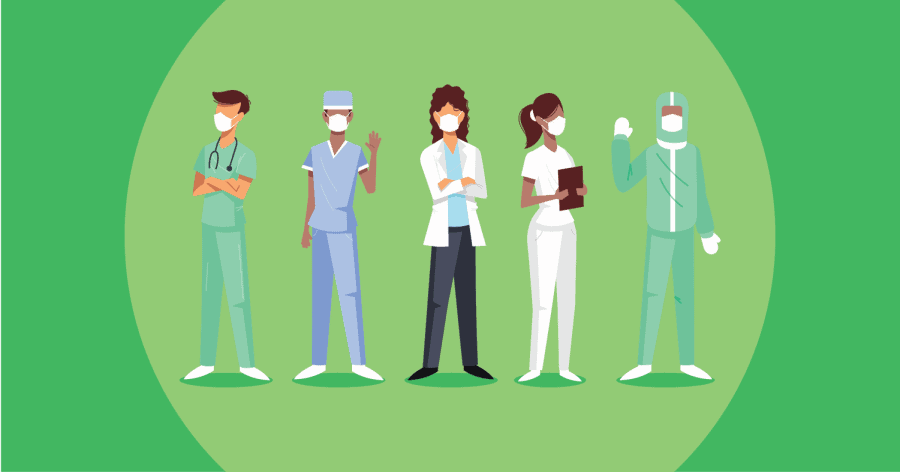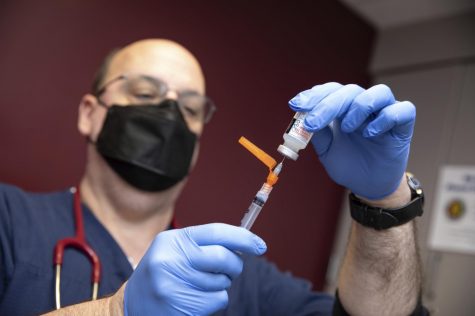How COVID-19 has kept some med students from getting the experience they need
Turbulent overcrowding in the medical industry has made it even more difficult for aspiring health care professionals to learn and grow.
April 14, 2021
While schools have started implementing in-person opportunities for students, outside field-work has not been as easily obtainable, especially for students pursuing careers in the medical field.
Before the pandemic, medical students had access to a variety of health care facilities where they could gain experience shadowing within the field. But in the past year, many of those programs struggled to balance COVID-19 guidelines with hands-on opportunities.
Druid City Hospital (DCH) in Tuscaloosa has worked closely with The University of Alabama for many years, having developed mentor programs such as the Nurse Extern Program. Andy North, the vice president of communications for DCH, said the hospital’s volunteering opportunities halted for a while, but in the last few months, DCH has been working to bring new and existing volunteers back to a more normal routine. North said the hospital has struggled to keep up with constantly changing regulations.
“It’s been very difficult, because it’s been continually changing,” North said.
Paige Rentfro, a junior majoring in biology, said it’s extremely beneficial for students to be able to have hands-on experience as a way to see what a medical professional endures on a daily basis. But this year’s offerings, which might have ranged from local clinicals to on-campus exercises before the pandemic, were scarce.
“To apply to medical school, students are expected to have gained service hours, shadowing hours, and research experience, and due to the current climate of our state and country, these opportunities have been extremely limited,” she said.
Rentfro is an aspiring physician whose passion for helping others has recently taken on new forms. She’s spent the past year educating others on the severity of COVID-19 and urging them to take the virus seriously.
“Students pursuing careers in the medical field should be up to date on current guidelines but also look into the science of the disease to gain a better understanding of what it means to hold a position in this field,” she said.
Students from all different backgrounds have chosen the medical profession not only as a way to help others but also to give back to people in their hometowns. Grace Glidden, a senior majoring in biology on the pre-medical track, has had a passion for the field ever since seeing the needs of the medically underserved community she grew up in.
“I want to be able to serve the community around me and help to make preventative healthcare accessible and affordable to everyone,” she said.
Outside field-work experience is imperative for any student, and especially those on the medical track. But the severity of the restrictions still in place pose a challenge.
Since closing down the volunteer program was not an ideal decision, the office has worked to bring back members, starting with younger volunteers and gradually bringing back senior volunteers who could be susceptible to the virus.
Glidden has been able to receive first-hand experience, with stipulations.
“I am still able to volunteer at the hospital, but we are now required to take our temperature coming in, wear masks, and the areas of the hospital and what we are allowed to do is more limited than before,” she said.
‘Sink or swim’
Across the country, medical students and professionals are feeling the effects of a demanding year. Fairfield County, Conn., roughly the size of the city of Tuscaloosa, has seen nearly 90,000 coronavirus infections and more than 2,000 deaths in the past year.
Margaret Healy, a first-year student in a pharmacy and physician assistant studies program at the University of Saint Joseph in nearby Hartford, was eager to further her involvement within her program. But Healy, who entered the field to enjoy a lifetime of learning and to work with people from different backgrounds, expressed frustration over the indifference she sees some students have toward the virus and the lack of respect for those working in the medical field.
Healy had said that during her final year as an undergraduate, college students could not obtain any internship opportunities with the Rhode Island Hospital Emergency Medicine Research program, or any surrounding facilities for that matter.
“Where I worked, Brown University, undergraduate and graduate students were not able to get into the hospital, so they were forced to work from home, so hours were cut drastically,” Healy said, adding that “non-COVID or clinical research projects are on pause or limited to remote work.”
“Look beyond your own health and how it is affecting healthcare workers’ physical and mental health, and how it is negatively impacting the progress of disease treatment and prevention not just in COVID, but in common diseases,” Healy said.
Brittany Mallon, an intensive care nurse at Greenwich Hospital and Yale New Haven Hospital Connecticut, has felt that toll. She said she’s experienced firsthand the effects that COVID-19 restrictions have placed on frontline workers in hospitals.
“From a nursing standpoint, it has been challenging from many perspectives. Several coworkers were in over their heads, either new graduate nurses or new to ICU,” she said. “It was like jumping into the deep end of the pool, sink or swim, but don’t look for support because everyone else is in the same pool.”
Mallon said both of her hospitals had different reactions to the rapid accommodations that the pandemic posed.
“At first, Greenwich was getting all the patients since they were so close to New York,” she said, noting that the small size of Greenwich hospital caused a steep learning curve for the staff. “Yale was two to three weeks behind. They had time to remove all the oncology patients to another campus, and make the patient rooms ready to accommodate the huge influx of patients.”
Mallon said she saw a correlation in the increase of COVID-19 patients and the increase in necessary supply delivery.
“While working at Yale, if you were working with new COVID patients in the previous oncology unit, you had a small travel monitor, barely able to see your patients’ vitals,” Mallon said. “[The] pharmacy was constantly [bringing] up bags of fentanyl, phenobarbital, ativan and paralytics, because we always ran out since the drips are at such high rates.”
Mallon praised the other departments within the hospital for their diligence and hard work. She spoke highly of the respiratory therapists, nurse assistants and doctors, as well as the nurses who are there, “at the bedside, listening, turning, cleaning [and] supporting the patient.” But though they all are working hard, Mallon said there has still been a “sick and lonely” type of devastation that has come with being a nurse during these times.
She said she made a promise to herself that as a nurse, she would not let her patients die without human contact. It’s a promise she couldn’t keep.
“Those that aren’t intubated, as nurses we stood next to them with iPads so they could say their final goodbyes on FaceTime since families weren’t allowed in to visit, holding back tears of our own, listening to these conversations,” she said.
‘That need has not diminished’
In Tuscaloosa, many of those who volunteer are not young college students but are individuals who have finished their careers and are looking to make a positive impact on the community. This led the volunteer office to make accommodations in order to guarantee the safety of volunteers who may be susceptible to the virus.
North said he encourages working as a volunteer in the hospital as a way to become immersed in different parts of the health care experience.
“[The program] gives nursing students in their two final semesters the opportunity to work side-by-side with an experienced nurse to get practicals done and come work at DCH for a year or two before deciding whether or not to stay long term,” North said.
North said students looking to work or volunteer in hospitals during this time are encouraged to do so.
The DCH volunteer office has coordinated many opportunities for volunteers to help from home while occupancy in hospitals is limited. Volunteer opportunities have ranged from making masks for hospital employees to delivering food to the hospital from members of the community that would donate food to employees.
“We need healthcare providers across the board: nurses, physicians, etc.,” North said. “That need has not diminished.”
He said his advice to anyone looking to volunteer during this time would be to keep searching for opportunities and as it relates to DCH, contact the volunteer office. The office is available for those that decide to create a new service.









